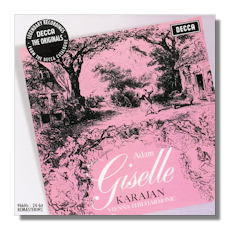
The Internet's Premier Classical Music Source
Related Links
- Adam Reviews
- Latest Reviews
- More Reviews
-
By Composer
-
Collections
DVD & Blu-ray
Books
Concert Reviews
Articles/Interviews
Software
Audio
Search Amazon
Recommended Links
Site News
 CD Review
CD Review
Adolphe-Charles Adam

Giselle (Excerpts)
Vienna Philharmonic Orchestra/Herbert von Karajan
Decca Originals 4757507 60:17
Although Herbert von Karajan worked endlessly to leave his mark on the German classics, I rank his Beethoven, Brahms and Mozart significantly lower than efforts by colleagues such as Jochum and Bohm. And despite making some very important opera recordings for Decca, I have never found his orchestral sessions from Vienna to be anything very special. I spoke candidly about Karajan's Mozart on the "Weekend Classics" line, finding it very uneven but worth hearing. This far newer and rather more valuable disc shows Karajan at his best in music that he excelled in.
Indeed, I imagine that it would horrify Karajan that (his 1960's and 1970's Beethoven cycles aside) he is best remembered for his efforts in ballet and some classic "New Years'" performances. Though he favored legato phrasing and a kind of tonal sheen that has since gone out of fashion, he always seemed to understand ballet music better than expected. His Tchaikovsky Suites on Decca Virtuoso are outstanding, with crisp and supremely polished playing from the Vienna forces. This disc shares many of the same qualities. Balances are pretty natural, and the winds and horns ring out as they must. I can't decide if Karajan's approach is heavy or exciting, but he makes this music sound awfully German at times. There's no question that the Viennese can give him what he wants, nor is there any doubt that the results are stunning. But there is very little French lightness and even less humor. Still, this recording was a really important entry to the catalog at the time. I can certainly understand why Decca wanted to re-release it.
If this review seems more like a commentary on Karajan the artist, it is. Over time, I have had the chance to sample parts of Karajan's legacy over his entire career. Unlike Eugene Ormandy, he has not suffered from disdain because of his approach, nor did his Nazi roots ever seriously damage his career. His brief time with Decca yielded some of his finest accomplishments on disc, mostly (as previously mentioned) in opera. His Planets and Tchaikovsky suites roundly outclass his remakes for Deutsche Grammophon. Conversely, his Strauss must be considered more successful elsewhere. The rest of his small Decca output (Brahms, Haydn, Dvořák) isn't competitive, here or on other labels. This makes this Adam album all the more important. Whatever the questions on how "French" the sound is frankly irrelevant. Because he never tackled this music again, and because it represents a high point in a decidedly uneven collection, this is truly one of Karajan's more unique and compelling records.
Copyright © 2015, Brian Wigman





















